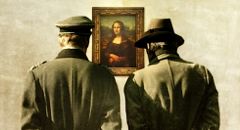
FRANCOFONIA (France/Germany/Netherlands 2015) ****
Directed by Alexandre Sukorov

Is the Louvre worth more than all of France?
Alexandre Sukorov made a name for himself directing the excellent documentary on Leningrad Museum years back, the entire exercise shot in one single take. FRANCOFONIA is a mixed documentary/re-enacted drama on the Louvre in Paris, arguably the most visited museum in the world, a museum that made Paris. And in the words of director, Sukorov who voices the film’s narrative, museums make the cities of the world.
The approach taken in this film is different as the idea of the two above mentioned films are different. What is the subject here is the restoration of the art pieces of the Louvre - especially during World War II during the German Occupation. As Germany invaded France, the government, citizens and Louvre officials all escaped south, for safety and stability. All but one, the Louvre Director Jacques Joujart who remained to prevent the treasures of the Louvre from becoming the spoils of the war and from landing in the hands of art lovers like Hitler and his consorts.
FRANCOFONIA is a complex and meditative film. It erases the barriers of time. Napoleon Buonaparte (played by Vincent Nemeth) frequently waltzes into the halls of the Louvre as the boat that transports the museum travels tosses among the strong waves of the ocean. The past and present are drawn together and at the film’s climax the two lead characters are advised of their death in the future.
Though the film delves on several issues, the main one is set in the June of 1940. German troops march into Paris. The two lead characters are Jacques Jaujard, Louvre director and German Count Franziskus Wolff Metternich (played in the film by Louis-Do de Lencquesaing and Benjamin Utzerath). It would seem that they are enemies, but it gradually becomes clear that they are not and that they have a lot in common. The period of their meeting, their confrontation and their cooperation during the Second World War to protect and preserve the treasures of the Louvre forms the bulk of FRANCOFONIA. By telling their story, Sokurov explores the relationship between art and power, and asks what art tells us about ourselves, at the very heart of one of the most devastating conflicts the world has ever known.
As Sukorov is Russian, it is only natural that he brings a Russian slant into his film. The Hermitage in Leningrad is more often than not tied in with the film’s narrative. WWII is also compared to the Russian war with the Bolsheviks. There are some chilling scenes added such as the image of a little girl lying dead on the steps of a building. As the narrative goes… no one to bury them, too tired to bury them. And if you think things cannot get any worse, a frozen child and mother on the street are the next subjects. The child is then taken, probably eaten, and the mother’s leg is missing.
Like RUSSIAN ARK, FRANCOFONIA is a profoundly beautiful film. Sukorov’s love for art is evident from the first to the last frame of his film. At the end audiences around the world will be grateful to Sukorov, who like the great two men in the film, has preserved art, in this case of the Louvre and its treasures, forever on film. Highly recommended to anyone who owns at least one painting.
The film is shot largely in Russian and French with a little English.



Comments powered by CComment